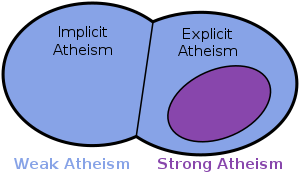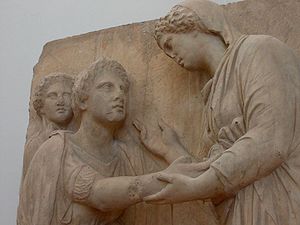 Image via Wikipedia
Image via Wikipedia
For the sake of being perfectly clear I will begin by giving a few definitions according to the Random House unabridged English dictionary.
"God - 1. The one Supreme Being, the creator and ruler of the universe."
"atheism - 1. The doctrine or belief that there is no God"
Now, if we dig no deeper than this we see that there are, obviously, atheists all around us. It is my contention, however, that it is contrary to our human nature and impossible to be a true atheist.
If one reads only the first definition of a word in the dictionary one is completely missing what language really is. Having said that I present a few more definitions and my own argument in this issue.
"God - 7. Any deified person or object.
9. To regard or treat as a god; deify; idolize."
"deity - 4. A person or thing revered as a god or goddess: a society in which money is the only deity."
"atheism - 2. Disbelief in the existence of a supreme being or beings."
"Supreme Being - see 'God'"
If we look at these definitions we have a basic foundation for my statement that there are no true atheists. In the second definition of "atheism" we see that the terminology is slightly adjusted. When looking at the concept with this definition we are led to the term "Supreme Being" for which I also provided a definition for. Looking to "Supreme Being" we see a simple reference to the word God for which I have now offered three definitions. Looking at the most recent two we see a god defined twice (once in print and once in an implied manner) as a person OR thing made into a deity or object of worship. Going further than this we are brought to the definition provided for "deity." By this definition we see yet a third reference to a god or deity as a person or thing. This forms the basis for my point.
An atheist, one who subscribes to "atheism," can not, by definition, exist. This is because a god is any thing or being made into a deity. Everyone by their very nature as a human offers belief and worship to someone or something. For some proclaimed "atheists" their god is money, or pleasure, or simply a belief in the world as the only truth. This is why I say there are no atheists.
Now, please, discuss and debate the points I have put forth.
P.S. I am well aware of the existence and definition of connotative meanings in language. As such, I understand that connotatively, at least as understood by today's cultures, does exist. I still deny however that these "de facto" non-believers are denotatively atheists.





